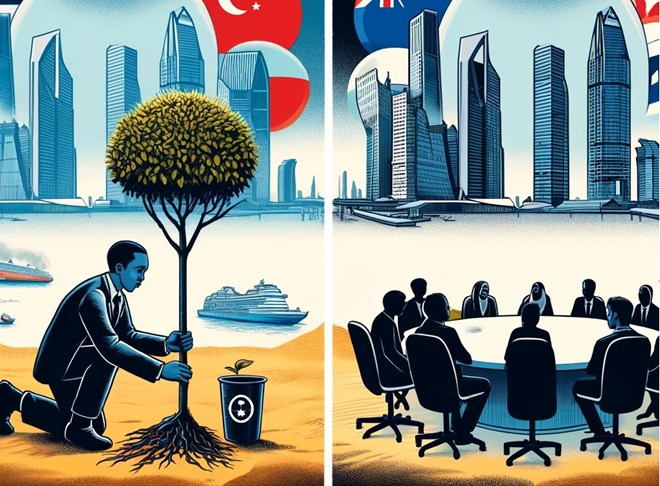Monday May 6, 2024
By Ismail Santur, CPA, CISA

This article explores the possibilities of crafting an anti-corruption model for Somalia, taking lessons from success stories from various countries across the globe.
Somalia has consistently ranked among the lowest in Transparency International’s Corruption Perception Index (CPI) for many years. As of 2023, Somalia has been at the bottom of the CPI for seventeen consecutive years. However, valuable lessons can be learned from the anti-corruption models of countries that consistently rank high in the CPI such as Singapore, New Zealand, Denmark, and Hong Kong. By understanding the key components of these models, Somalia can craft a tailored approach to effectively tackle corruption within its contexts.
Successful anti-corruption efforts require a multifaceted approach that encompasses both preventive measures and robust enforcement mechanisms. Here are the characteristics of successful anti-corruption models along with the advantages and disadvantages of each:
The Singapore Model:
- Strict Enforcement and Deterrence: Singapore has a strong legal framework and a zero-tolerance policy towards corruption. The Corrupt Practices Investigation Bureau (CPIB) enforces anti-corruption laws vigorously, with severe penalties for offenders.
- Preventive Measures: Singapore combines enforcement with preventive measures such as stringent financial regulations, transparent public procurement processes, and a robust civil service code of conduct.
- Political Will and Leadership: Political leadership in Singapore has consistently prioritized anti-corruption efforts, fostering a culture of integrity and accountability throughout the government and society.
Advantages include deterrence through, fear of punishment, accountability, and restitution. However, it can be resource-intensive, and implementation could take a long time.
The New Zealand Model:
- Transparency and Accountability: New Zealand's anti-corruption model emphasizes transparency, accountability, and public integrity.
- Strong Institutions and Governance: New Zealand benefits from strong institutions, independent oversight bodies, and a well-functioning public sector characterized by high levels of professionalism and integrity.
- Whistleblower Protection: New Zealand provides robust legal protections for whistleblowers, encouraging individuals to report corruption without fear of retaliation.
Advantages include fostering accountability, empowering citizens, and enabling scrutiny of government actions. However, the implementation may face resistance from vested interests and limited access to information.
The Danish Model:
- Openness and Trust: Denmark's anti-corruption model is characterized by openness, trust, and a high degree of social cohesion. The country has a strong tradition of transparency, participatory governance, and citizen engagement.
- Decentralized Decision-Making: Denmark's decentralized governance structure promotes local accountability and citizen involvement in decision-making processes, reducing opportunities for corruption.
- Strong Rule of Law: Denmark's strong rule of law, independent judiciary, and effective law enforcement contribute to low levels of corruption and high public trust in institutions. However, a decentralized governance structure and independent judiciary require well-developed public institutions and human resources.
The Hong Kong Model:
- Independent Judiciary and Rule of Law: Hong Kong benefits from an independent judiciary and a legal system based on the rule of law, which helps to safeguard against corruption and ensure accountability.
- Efficient Public Administration: Hong Kong has a reputation for efficient public administration, characterized by meritocracy, professionalism, and strict adherence to ethical standards.
- Strong Regulatory Framework: Hong Kong's regulatory framework includes robust anti-corruption laws, financial regulations, and oversight mechanisms, contributing to a relatively clean business environment.
Hong Kong’s efficient public administration and strong regulatory framework contribute to competent public financial management in addition to strengthening anti-corruption activities. However, it could be resource-intensive and take time to reap the benefits.
Due to its limited resources, both financial and human, Somalia should, in the short run, prioritize low-hanging fruits such as education and public awareness to illuminate the adverse impacts of corruption, while developing an independent judiciary, regulatory framework, and efficient public administration in the long run. Although Somalia has made a remarkable improvement in developing public institutions, more emphasis should be placed on strengthening public financial management to make it more efficient, accountable, and transparent.
While the fight against corruption is undoubtedly challenging, it is not insurmountable. By drawing inspiration from the experiences of countries that have successfully tackled corruption, Somalia can chart a path toward a more transparent, accountable, and equitable future. With political will, strong institutions, and the support of citizens, the goal of rooting out corruption and fostering integrity can be realized, paving the way for sustainable development and prosperity.
Ismail Santur is a Certified Public Accountant in the USA with over 25 years of experience in financial management, audit, governance, and compliance in the public as well the private sector.